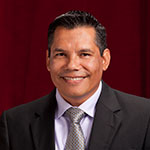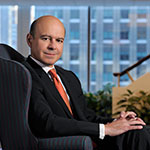When Ric Urrutia returned to California from his native Guatemala in 1980, Atari and Intel were thriving in Silicon Valley. Urrutia loved computers and knew how to program. His father, a civil engineer, was Guatemala’s first chief information officer (CIO) and installed the first IBM mainframe in Central America. It wasn’t long before Urrutia found himself freelancing for one of Silicon Valley’s most promising young tech firms.
The company was growing by 700 percent a year, but it was too hit-or-miss for Urrutia. Working on projects that didn’t scale, in an environment where talent was scarce, and with a team that habitually missed deadlines was frustrating. There had to be a better way. He walked away from that company (Apple Inc.) in 1989. Urrutia was convinced he could build a different kind of company—one dedicated to hiring, training, and retaining the best and brightest instead of relying on an inconsistent network of consultants. Although Apple went on to become one of the world’s most iconic brands, Taos thrived by finding its own niche.
To some, Taos is a mountain town in New Mexico, but in Silicon Valley, it is one of the most respected and profitable IT services firms in the region. Urrutia’s partner, Alexis Tatarsky, named the firm after the town, where his mother grew up.
“One mantra built Taos,” Urrutia says. “We talk to our customers on a very deep, technical level to understand exactly what they need, and we hire the most talented people in the world to provide it.” Seemingly overnight, Taos was attracting clients, hiring employees, and moving out of its first office in Tatarsky’s home.
Building a successful tech company is never easy, and Urrutia says entrepreneurs must be willing to take risks. “My neighbor in Guatemala had little education but made more money working for himself than my educated parents did. I saw how important it is to be successful doing something you like,” he says. When Taos started, Urrutia’s wife was pregnant with the couple’s third child. Still, he forged ahead. “We had all the right ingredients,” he says, “so we had to take a shot.”
The risk has paid off. By August of 1990, Taos was moving into a new 1,000-square-foot office space with 12 employees. Urrutia and Tatarsky hired accountants, recruiters, salesmen, and marketers. Throughout the years, two things have been constant: growth and change. Taos has hired 5,000 people and served 1,000 different companies. The firm has imported talent from Australia, Asia, Latin America, and Europe. Clients from years past are now CIOs and CEOs at companies like Facebook, Ebay, and LinkedIn. “We’re a household name in the tech fields, and we have a seat at the table with any high-tech company,” says Urrutia.
As it enters its 25th year, Taos is hiring about five employees per week with a total number around 500. It has offices in California—San Jose, San Francisco, and Los Angeles—and Boston. A service center in Boise, Idaho holds another 150 workers who help the company deliver remote IT services to customers around the country.
Urrutia has been in the industry for 33 years, and he’s lived through many highs and lows. Despite it all, he remains energized by unending challenges and opportunities. “I’ve never seen technology change as fast as it does today. It’s inspiring, fun, and scary,” he says. As consumers embrace e-commerce and businesses generate revenue online, people rely primarily on the Internet to do business. That requires computers to securely process an unimaginable amount of data as quickly as possible.
When Urrutia started as a programmer, his teams released products just one or two times a year and had plenty of time to test code, assure quality, and launch in beta. Today, apps go through the process in 24 hours before companies send them to all corners of the planet. Errors are magnified, and developments are obsolete in less than a year. “It’s not an evolution, it’s a revolution,” Urrutia remarks.
Taos stays relevant in the fast-moving industry by investing heavily in training and development. Urrutia and his leadership team hire “smart and hungry” people who want to learn as much as possible. Then, Taos approaches its clients to demonstrate how the company can train and onboard people to deliver results faster than their own internal processes would allow.
Urrutia, who has enjoyed tremendous success in Silicon Valley, knows that with success comes responsibility. He is partnering with like-minded individuals (including the former mayor of San Jose) to steer young Hispanics towards the science, technology, engineering, and math fields. He also contributes to a program at Year Up—an organization providing skills, experience, and support to urban young adults—by equipping its patrons with tech skills. Programs such as these ensure companies like Taos will have the diverse talent they need to keep innovating long into the future.

